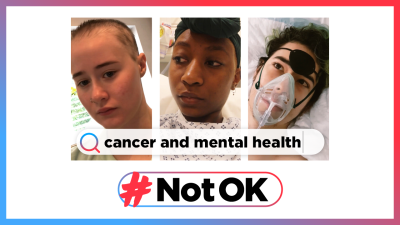A third of young people with cancer unable to access mental health services
We are launching our #NotOK campaign calling on UK Governments to improve access to psychological support for young people with cancer
- Published:
- Category:
- Policy and campaigns
Young people with cancer are unable to access specialist mental health support in parts of the UK, putting them at risk of life-long trauma, according to our report.
Psychologists are ‘firefighting’ to keep up with the high demand for ‘limited resources’, as over half of young people with cancer admit to poor mental health.
More than a third of young cancer patients surveyed had reduced or no access to a psychologist in the last six months, due to inadequate access in parts of the UK.
We are launching our #NotOK campaign, which calls on UK Governments to:
- End the postcode lottery by providing guaranteed access to specialist psychologists
- Develop and fund a comprehensive blueprint of psychological care for young people with cancer
Our ‘#NotOK: Filling the gaps in mental health support for young people with cancer’ report warns that young cancer patients could face depression, anxiety and other mental health conditions well into their adult lives unless UK Governments provide protected funding for high quality psychological support.
87% of psychologists surveyed say current national provisions for specialist psychological support for teenagers and young adults with cancer is insufficient to meet their specific needs.
The report also reveals that:
- Just over half (52%) of young people said their mental health and wellbeing had been very poor (17%) or poor (35%).
- 57% of young people felt they had needed to see a psychologist in the six months prior to being surveyed but 35% either had not (20%) or had reduced access (15%).
- 70% of young people said that fewer opportunities to speak to other young people with cancer had had an impact on their wellbeing.
Dr Louise Soanes, Chief Nurse, Teenage Cancer Trust said: “Young people are at a unique stage in their lives. They are discovering who they are and undergoing rapid developmental changes. A cancer diagnosis pauses that. They suddenly lose any newfound independence, and they don’t know whether they’re going to live or die. Meanwhile, life around them goes on.
“Psychological support is as important as the treatment for the cancer itself. Yet more than a third of young cancer patients we spoke to have had no, or reduced access to specialist support in the six months prior to being surveyed. This must improve.
“Tailored and comprehensive support to deal with the impact of cancer is vital because, without it, there’s a risk young people’s mental health trauma will outlive their cancer diagnosis. That’s why we’re calling on UK Governments to keep young lives on track by ensuring this desperately needed specialist support is available from diagnosis wherever a young person lives.”
Before the pandemic, a study exploring young people with cancer’s mental health during treatment showed 90% reported anxiety, 83% felt loneliness, 70% faced depression and 42% experienced panic attacks. High demand for mental health support is not new, but Covid-19 has meant that young people with cancer have never needed it more urgently.
“I didn’t feel like I could ask for help. I would have felt like a fraud”
Chloe Dalton-Baker, 23, from Scunthorpe, was 20 when she was diagnosed with thyroid cancer. She had to have both thyroid glands removed but didn’t need chemotherapy or radiotherapy. Chloe had been told she had the ‘good type of cancer,’ which made her feel guilty and stopped her asking for psychological support.
“I didn’t feel like I could ask for help. I would have felt like a fraud,” she said.
“You feel like you don’t deserve it, and that they should be spending their time helping people who had had chemotherapy or radiotherapy instead. It was a throwaway comment, but those four words really messed things up for me.”
Three years since her treatment, Chloe believes that seeing a counsellor or a psychologist would have helped her get that closure.
“If I’d got that help, she said. “I would have had a more positive outlook overall and been in a much better place.
“I would encourage people not to bottle up how they are feeling and to ask for help if they aren’t immediately offered it. It is OK to not to feel OK.”
What Teenage Cancer Trust is doing to help
Through the specialist nurses and youth support coordinators it funds, we are the only UK charity dedicated to meeting the specialist nursing, care and support needs of young people aged 13-24 with cancer.
We pioneered the creation of age-appropriate environments which are found in all of its 28 Teenage Cancer Trust units in NHS hospitals.
Throughout the pandemic, our charity has been a lifeline for many young people with cancer, providing specialist nursing and emotional support at a time of unpredictability and heightened restriction. Psychological support continues to play a vital role in the different stages of a young person’s life.
While all UK nations have acknowledged the needs of teenage and young adult cancer patients in accessing psychological support, our findings show that not all young people are currently able to access the support they need.
“This report demonstrates how these positive intentions are not being consistently met,” Dr Soanes said. “We know there are some excellent examples of good practice out there. We now need UK Governments to work with us and other experts to agree and fund a model of care that suits the specific needs of teenagers and young adults with cancer.”
Right now, many young people are facing cancer without the mental health support they need. That’s not OK. You can help us change it – email your MP today and join our campaign.



